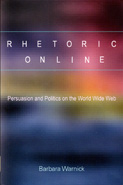In a brief concluding chapter, Warnick reminds readers that her aim was to show that persuasive public discourse on the Web is well-developed, has a wide reach, and can have real effects. The Web has certainly not subsumed all other means of persuasive discourse, but neither is it a bit player. The Web will repay systematic study by rhetorical scholars and critics, albeit after some refiguring of critical tools and methods. Warnick reiterates that selected scholarship in media theory, blended with a broad vision of what rhetoric is and how it functions, provides possibilities for this refiguring and briefly recaps her case studies from the earlier chapters.
Warnick argues that during the necessary refiguring of critical tools and methods, a long view is best. She likens the effects of the Web’s “new media” disruptions of settled assumptions about writing and reading to Walter Ong’s examination of the rise of the written word and its effects on ancient Greek oral communication. While media may change, human beings will never cease inventing, presenting, and shaping ideas and values. The challenge for scholars is to maintain the vitality of their methods in the face of innovations in human discursive environments. Warnick’s book shows how such a challenge can indeed be met.
Continue to Assessment
